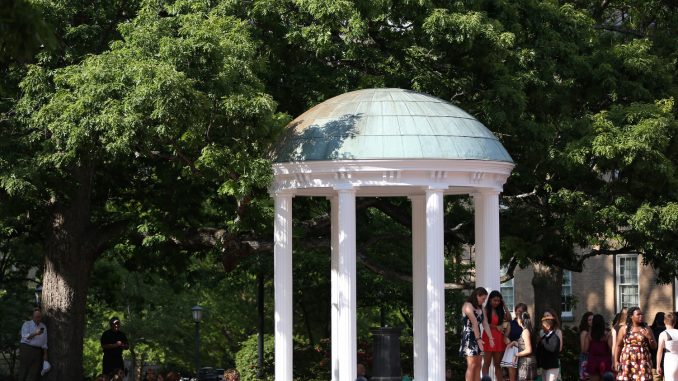
 This week, the UNC Board of Governors will vote on whether to raise the campus security fee at the 16 universities in the UNC System by $30 per student. In a year when many other fees, as well as undergraduate tuition, are frozen, this increase is an outlier — but a necessary one.
This week, the UNC Board of Governors will vote on whether to raise the campus security fee at the 16 universities in the UNC System by $30 per student. In a year when many other fees, as well as undergraduate tuition, are frozen, this increase is an outlier — but a necessary one.
The campus security fee, which was first approved in 2015, funds campus safety and security initiatives, including salaries, training, and operations. It was adopted in response to the 2013-14 UNC Campus Security Initiatives Report, which included recommendations for “new initiatives, staffing, and security measures” to improve safety across the System. The fee is currently $30 per student per year — the same as it has been since 2015.
But since that time, the demands on university police departments have increased significantly. From July 1, 2017, to June 30, 2018, UNC-Chapel spent $390,000 to provide security in the area around Silent Sam, a Confederate memorial that was later toppled by protestors. Black Lives Matter protests further strained police departments. In some cases, university police departments are being asked to enforce universities’ social distancing rules.
The recommendations of the UNC System’s recent Racial Equity Task Force report will add to campus police departments’ expenses. Among other recommendations, the report calls for equipping all campus police officers with body cameras and less-lethal devices in addition to firearms, both costly additions.
These factors, as well as increased suspicion and nationwide calls to “Defund the Police,” have made recruiting more difficult. A 2020 survey of police departments by the Police Executive Research Forum revealed that there has been a decrease in applications, an increase in early exits and higher rates of retirement at departments across the country.
Frederick E. Sellers, the senior associate vice president for safety and emergency operations, gave a presentation to the Board on the topic of “Campus Safety and Security — Recruitment & Retention” on Jan. 20.
Campus police salaries are, on average, less than 80% of the salaries paid by municipal police departments and county sheriff’s offices.
“UNC Police Departments are also struggling to recruit qualified applicants. Many reported previously they received 40-50 applications for a position. Currently, many are only receiving 8 applications per position,” he said.
As of Jan. 20, there were 82 vacant officer positions across the system. Sellers also noted that N.C. Community College Basic Law Enforcement Training programs across the state are seeing dramatic drops in student enrollment.
Campus police salaries are, on average, less than 80% of the salaries paid by municipal police departments and county sheriff’s offices, according to a Jan. 20 presentation by Matthew Brody, chief human resources officer for the UNC System.
The fee increase seeks to address these issues. Each campus will be directed to use a portion of the fee to raise salaries of police officers and 911 operators. The increased fee will also contribute to law enforcement training and protective equipment.
Campus security is an essential service that current funding levels cannot adequately sustain. Sufficient funding for campus security should be a top priority for UNC leaders and administrators. But it’s also important to keep higher education affordable for North Carolina students, especially in a pandemic. Members of the UNC Board of Governors should offset any increases in Campus Security Fees by cutting fees elsewhere. Doing so would ensure that students are safe and that students and parents aren’t surprised by new fees at a difficult time. Campus security and fiscal prudence can go hand-in-hand.


